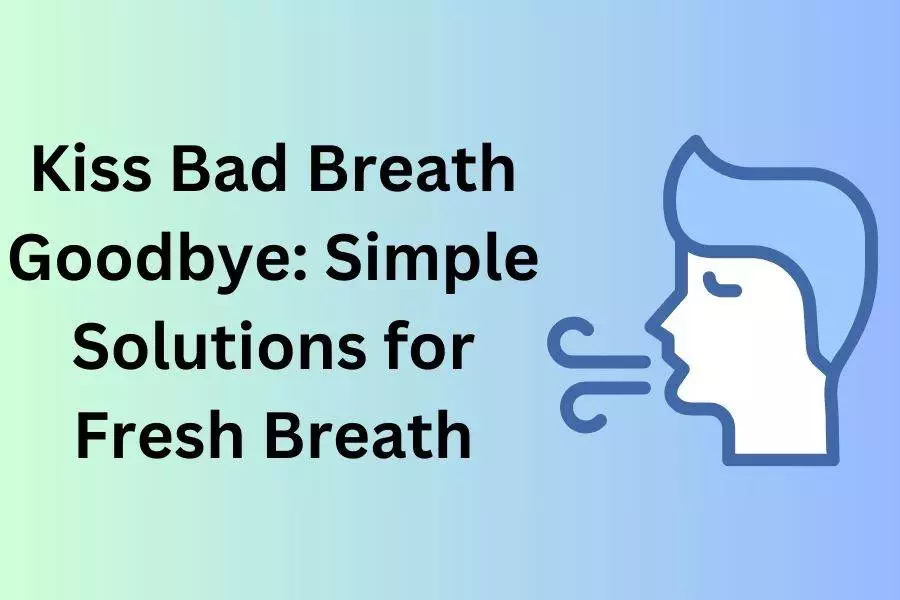
- Understanding the Causes of Bad Breath
- Practice Good Oral Hygiene
- Brushing and Flossing Techniques for Fresh Breath
- The Benefits of Tongue Scraping
- Use of Mouthwash and Breath Fresheners
- Natural Remedies for Bad Breath
- Diet and Nutrition for Fresh Breath
- Avoiding Bad Breath Triggers
- Seeking Professional Help for Chronic Bad Breath
- Enjoying Fresh Breath Every Day
Fresh breath is not only important for maintaining good oral health, but it also plays a crucial role in personal and professional relationships. Bad breath, also known as halitosis, can have a negative impact on how others perceive us and can lead to embarrassment and self-consciousness. On the other hand, fresh breath can boost our confidence and self-esteem, allowing us to interact with others more comfortably.
When we have bad breath, it can create distance between us and the people around us. Whether it’s a romantic partner, friends, or colleagues, bad breath can make others want to keep their distance. It can be difficult to form meaningful connections when we are constantly worried about the odor coming from our mouths. Fresh breath, on the other hand, can help us feel more at ease in social situations and allow us to focus on building strong relationships.
In addition to its impact on relationships, fresh breath is also important for our own confidence and self-esteem. When we have bad breath, we may feel self-conscious and anxious about interacting with others. This can lead to a lack of confidence in social and professional settings. On the other hand, when we have fresh breath, we feel more comfortable speaking up and expressing ourselves. This can have a positive impact on our overall well-being and success in various aspects of life.
Understanding the Causes of Bad Breath
To effectively combat bad breath, it’s important to understand its causes. The primary cause of bad breath is the presence of bacteria in the mouth. These bacteria break down food particles and release foul-smelling gases as a byproduct. Poor oral hygiene is one of the most common causes of bad breath as it allows bacteria to thrive in the mouth.
Other common causes of bad breath include dry mouth (xerostomia), which reduces saliva production and allows bacteria to multiply; certain foods like garlic and onions that contain volatile compounds that can be carried on the breath; and smoking, which not only leaves a distinct odor but also dries out the mouth and promotes bacterial growth.
Practice Good Oral Hygiene
One of the most effective ways to combat bad breath is to practice good oral hygiene. This includes brushing and flossing regularly to remove food particles and bacteria from the mouth. It is recommended to brush at least twice a day, using a soft-bristled toothbrush and fluoride toothpaste. Flossing should be done at least once a day to remove plaque and food debris from between the teeth.
When brushing, it’s important to pay attention to all surfaces of the teeth, including the front, back, and chewing surfaces. Brushing should be done in gentle, circular motions for about two minutes each time. It’s also important to replace toothbrushes every three to four months or sooner if the bristles become frayed.
Brushing and Flossing Techniques for Fresh Breath
To ensure fresh breath, it’s important to use the right toothbrush and toothpaste. A soft-bristled toothbrush is recommended as it is gentle on the gums and teeth. Hard bristles can cause gum irritation and enamel erosion. Fluoride toothpaste is also important as it helps strengthen the teeth and prevent cavities.
When brushing, it’s important to use proper technique. Start by placing the toothbrush at a 45-degree angle against the gumline and gently move the brush back and forth in short strokes. Be sure to brush all surfaces of the teeth, including the inner, outer, and chewing surfaces. Don’t forget to brush your tongue as well, as bacteria can accumulate on its surface.
Flossing is equally important for fresh breath. It helps remove plaque and food particles from between the teeth where a toothbrush cannot reach. To floss effectively, take about 18 inches of floss and wrap it around your middle fingers, leaving about two inches of floss between your hands. Gently slide the floss between the teeth, using a back-and-forth motion. Curve the floss around each tooth in a C shape and move it up and down to remove plaque and debris.
The Benefits of Tongue Scraping
In addition to brushing and flossing, tongue scraping is another effective technique for fresh breath. The tongue is a common breeding ground for bacteria, which can contribute to bad breath. Tongue scraping helps remove bacteria and debris from the surface of the tongue, improving breath odor.
To use a tongue scraper, start by rinsing it with warm water to remove any debris. Hold the scraper with both hands and gently place it at the back of your tongue. Apply light pressure and drag the scraper forward, scraping the entire surface of the tongue. Rinse the scraper after each pass and continue until you have scraped the entire tongue. Be sure to rinse your mouth with water afterward to remove any loosened bacteria or debris.
Use of Mouthwash and Breath Fresheners
Mouthwash and breath fresheners can provide temporary relief from bad breath, but they should not be relied upon as a long-term solution. Mouthwash can help kill bacteria in the mouth and freshen breath, but it should be used in conjunction with regular brushing and flossing.
When choosing a mouthwash or breath freshener, look for products that contain antibacterial ingredients like chlorhexidine or cetylpyridinium chloride. These ingredients help kill bacteria that cause bad breath. It’s important to follow the instructions on the product label and not to swallow mouthwash as it may contain alcohol or other harmful ingredients.
Natural Remedies for Bad Breath
For those who prefer natural remedies, there are several options available for freshening breath. Herbs like mint, parsley, and cloves have natural antibacterial properties and can help freshen breath. Chewing on a sprig of fresh mint or parsley after a meal can help neutralize odors and promote fresh breath.
Essential oils like peppermint, tea tree, and eucalyptus can also be used to freshen breath. These oils have antimicrobial properties and can help kill bacteria in the mouth. To use essential oils, add a few drops to a glass of water and use it as a mouth rinse. Be sure to use high-quality, food-grade essential oils and dilute them properly before use.
Diet and Nutrition for Fresh Breath
Diet plays a significant role in breath odor. Certain foods and drinks can leave a lingering odor on the breath, while others can help freshen breath. Foods like garlic, onions, and spicy foods contain volatile compounds that can be carried on the breath for hours after consumption. Avoiding these foods or brushing and flossing immediately after consuming them can help minimize their impact on breath odor.
On the other hand, there are foods and drinks that can help freshen breath. Crunchy fruits and vegetables like apples, carrots, and celery can help stimulate saliva production, which helps wash away bacteria and food particles. Green tea is another good option as it contains polyphenols that can help reduce bacteria in the mouth.
Staying hydrated is also important for fresh breath. Drinking plenty of water helps keep the mouth moist and promotes saliva production, which helps wash away bacteria and food particles.
Avoiding Bad Breath Triggers
In addition to practicing good oral hygiene and making healthy dietary choices, it’s important to avoid bad breath triggers. Smoking is one of the most common causes of bad breath as it not only leaves a distinct odor but also dries out the mouth and promotes bacterial growth. Quitting smoking or reducing tobacco use can significantly improve breath odor.
Alcohol consumption can also contribute to bad breath as it dries out the mouth and promotes bacterial growth. Limiting alcohol intake or avoiding it altogether can help improve breath odor. It’s also important to note that certain medications can cause dry mouth and contribute to bad breath. If you suspect that your medication is causing bad breath, speak to your doctor about possible alternatives.
Seeking Professional Help for Chronic Bad Breath
If you have tried all the above methods and still suffer from chronic bad breath, it may be time to seek professional help. Chronic bad breath can be a sign of an underlying dental or medical condition that needs to be addressed.
A dentist can help identify any dental issues that may be contributing to bad breath, such as gum disease, cavities, or oral infections. They can provide treatment and guidance on how to improve oral hygiene practices.
In some cases, chronic bad breath may be a symptom of an underlying medical condition such as sinusitis, respiratory infections, or gastrointestinal issues. If your dentist rules out any dental causes for your bad breath, they may refer you to a doctor for further evaluation and treatment.
Enjoying Fresh Breath Every Day
Fresh breath is not only important for maintaining good oral health but also for our personal and professional relationships. It boosts our confidence and self-esteem, allowing us to interact with others more comfortably. To achieve fresh breath, it’s important to practice good oral hygiene, including regular brushing and flossing. Tongue scraping, using mouthwash and breath fresheners, and incorporating natural remedies can also help freshen breath. Making healthy dietary choices, avoiding bad breath triggers, and seeking professional help for chronic bad breath are also important steps in maintaining fresh breath every day. By prioritizing fresh breath and adopting healthy habits, we can enjoy improved confidence and stronger relationships.









